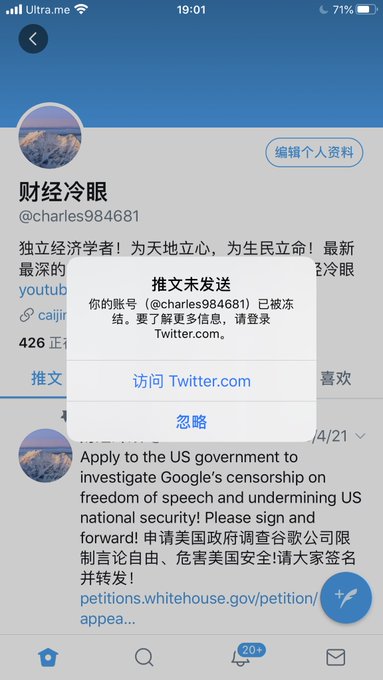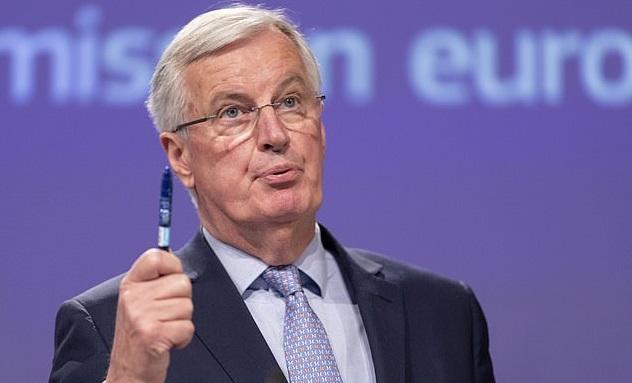By Keoni Everington, of the Taiwan News
A White House petition was created last week after news broke that the Twitter accounts of Chinese dissidents started to disappear after a controversial Chinese-American artificial intelligence (AI) expert was hired to serve on the company's board.
On May 11, Twitter announced in a press release that it was hiring Li Fei-Fei (李飛飛), an AI expert and former vice president of Google, to its board of directors as a "new independent director" with immediate effect. Li quit Google in 2018 after a trail of leaked internal emails revealed that she appeared to be more concerned about the public relations damage to Google's image if news broke about the company's work on Project Maven than the ethical issues raised by over 3,000 Google employees.
Project Maven is a U.S. Department of Defense AI project that seeks to use the technology to help military drones select targets from video footage.
During her tenure at Google, there is no public record of Li objecting to the controversial Project Dragonfly, which was meant to be a search engine that would suit China's censorship rules, as she opened an AI research facility in Beijing.
When she took the helm of Google's new AI center in Beijing, Li was quoted in Chinese media as using the CCP slogan "stay true to our founding mission" and said that "China has awakened." In addition, Li allegedly has ties to a student association that is affiliated with the Chinese Communist Party's (CCP's) United Front, according to Radio Free Asia.
A week after Li joined Twitter, a Chinese writer who goes by the handle Caijinglengyan (財經冷眼), discovered that four of his accounts were simultaneously deleted on May 18. He did not receive an explanation until May 23, when he was told his accounts had been taken down for violating Twitter's rules against posting identical content on duplicate accounts.
我是财经冷眼,可能因做了深挖李飞飞红色背景的节目,导致财经冷眼、冷山时评、自由风等4个推号同时封杀!新官上任,果然越来越红了!
希望大家帮忙转发,找回失去的网友!同时我也在申诉,并联系媒体报道!不排除法律起诉的选项! 今天封我,后面可能会封任何批评中共的平台!希望推特作恶不要太离谱
1,967 people are talking about this
He countered that he had only posted content on one of the accounts and used the other to retweet the original post. He pointed out that Twitter does not have a policy precluding a person from having more than one account.
The writer stated that he believes the real reason for his account cancellations was that, on May 17, he tweeted that Twitter's new board member has a "red background." In the post, he alleged that she is a member of a student association affiliated with the CCP's United Front and has close ties with "Second Generation" and "Third-Generation Reds."
Caijinglengyan claimed that many other Twitter accounts used by Chinese dissidents were suddenly suspended without notice. After he contacted them, he found that they had also criticized Li or started commenting about Li just before their accounts were banned.
The writer listed @beacon__news (灯塔爆料社) and @kevinheaven9 (Calvin看美国) as other Twitter users who found their Twitter accounts suddenly shut down. He claimed that one Twitter user simply wrote "Li Fei-Fei is coming, I have to run," and soon found that both his primary account and secondary account had been suspended.
French-based Chinese dissident Wang Longmeng (王龍蒙) wrote that Twitter's ban on those who criticized Li and exposed her background "was undoubtedly related to Li Feifei's appointment as a director, because criticism and negative information were banned, which is Beijing characteristic," reported Liberty Times. He believes that Twitter was quickly "dyed red" after Li took charge.
On May 20, a petition was created on the White House website titled "Call for a thorough investigation on Twitter's violation of freedom of speech." The creator of the petition wrote that Twitter is suppressing criticism of the CCP and suspending dissident accounts while pro-Beijing accounts remain unscathed.
The petition listed May 18 as a date when many "anti-CCP" Twitter users found their accounts permanently suspended. The author of the document pointed out Li's involvement with Project Maven and alleged that she was engaged in extensive military-technical programs while running Google's AI center in Beijing.
The document then alleged that Li continues to have "close ties with top leaders of the CCP." The petition closed by calling on the U.S. government to investigate "Twitter's violation of freedom of speech, and on Dr. FeiFei Li's collaborations with the CCP, a threat to national security."




